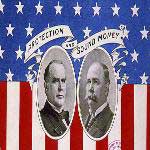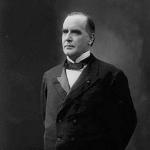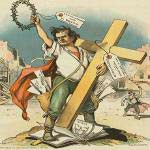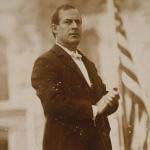
STEVE EMBER: Welcome to the MAKING OF A NATION -- American history in VOA Special English.
In the 1890s, the American people were deeply divided over the nation's money system. Should the United States support its currency with gold or with gold and silver? This question became the main issue in the presidential election of 1896.
This week in our series, Kay Gallant and Harry Monroe tell the story of that election.
KAY GALLANT: Many Americans wanted a gold standard. They said the United States should support its money only with gold. A gold standard, they said, would keep the value of the dollar high. These people were called "gold bugs." Most were businessmen, bankers, and investors.
Many other Americans wanted the United States to support its money with both gold and silver. They thought the value of the dollar was too high. A high dollar, they said, drove down prices for agricultural products. A silver standard would lower the value of the dollar. These people were called "silverites."Most were farmers, laborers, and owners of small businesses."
HARRY MONROE: The debate over gold and silver was especially important because of an economic depression that began in the United States in 1893. Thousands of banks and businesses closed. Millions of men lost their jobs. Foreign investors withdrew their money from America. Americans who had money were afraid to invest it.
Many people believed the depression would end if the government issued more paper money backed by silver.
President Grover Cleveland disagreed. And he opposed any legislation that might threaten the gold standard. He noted that every major nation supported its paper money with gold. The United States would be foolish, he said, not to do the same. It could not stand apart from the world's other money systems.
KAY GALLANT: President Cleveland belonged to the Democratic Party. By 1896, many Democrats had become silverites. They gained control of party organizations in several western and southern states. They called Cleveland a traitor to his party and to the American people. They did not want him to be the party's candidate in that year's election.
The Republican Party also was divided over the issue of gold and silver. Some members from silver-mining states in the west left the party. Others remained in the party, but gave support secretly to silverite Democrats.
Republicans had done well in the congressional elections of 1894. They won control of both the Senate and House of Representatives. Party leaders were sure a Republican could be elected president in 1896. The most likely candidate appeared to be Governor William McKinley of Ohio.

HARRY MONROE: McKinley was, in fact, nominated on the first ballot at the Republican convention in St. Louis, Missouri.
The Democratic Party held its nominating convention in Chicago, Illinois. The most likely candidate was Congressman Richard Bland of Missouri. A majority of convention delegates, however, were silverites. And they expected to nominate a silverite candidate.
Supporters of President Cleveland wanted to test the silverites' strength. They demanded a debate on the gold-silver issue.
Several men spoke in support of President Cleveland and the gold standard. Several spoke in support of silver. The last to speak was Congressman William Jennings Bryan of Nebraska. He had led an unsuccessful fight in Congress to keep America using silver.
KAY GALLANT: Bryan spoke emotionally during the convention debate. He said he represented America's farmers, laborers, and small businessmen who wanted a silver standard.

Bryan ended his speech with a line that became famous during the campaign. It called to mind the torture and death of Jesus Christ. Bryan said gold supporters could not force their money system on silver supporters. "You shall not," he said, "crucify mankind upon a cross of gold."
With those words, William Jennings Bryan won the nomination away from Congressman Bland. He would be the Democrats' presidential candidate. He was just 36 years old.
HARRY MONROE: A number of Democrats refused to accept Bryan as their candidate. They withdrew from the Chicago convention and held one of their own. They called themselves National Democrats. They nominated candidates for president and vice president. But they did not win many votes in the election.
America's third party at that time -- The People's Party -- had a difficult decision to make.
Populists, as they were called, agreed with silverite Democrats that the United States should have a silver standard. So, some believed the party should unite with the Democrats to support democratic candidate William Jennings Bryan. If they did not, Republican William McKinley was sure to win the election.
Other populists feared that such a union would mean the end of the People's Party.

The populists solved the problem at their nominating convention. Like the Democrats, they chose Bryan to be their candidate for president. But they chose a different candidate for vice president. In this way, William Jennings Bryan was able to run for president at the head of two separate political parties.
KAY GALLANT: There was a great difference in the way the two presidential candidates campaigned. William McKinley refused to travel. Instead of going to the voters, he let the voters come to him. And they did. Railroad companies supported McKinley. They ran special trains to his home in Ohio. The trip was free.
Each trip was the same. A band met the train and marched with the group to McKinley's home. McKinley came outside to hear a statement of support from the leader of the group. Then he made a short speech and shook hands. The group left and another one came.
On one day of the campaign, McKinley met 30 groups this way. That was more than 80,000 people.
HARRY MONROE: While McKinley stayed at home, William Jennings Bryan travelled. He visited 27 states and spoke to five million people. Bryan explained that he had to travel, because the Democratic Party did not have enough money to campaign in other ways. Bryan spent 650,000 dollars on his campaign. McKinley spent three-and-a-half-million dollars.
Bryan's main campaign idea was that the gold standard would ruin America's economy. McKinley's main campaign idea was that silver money would ruin the economy. For a time, Bryan's campaign seemed to be succeeding. More and more people promised to support him. Then, in the final weeks before election day, the situation began to change.
The depressed economy showed signs of improving. The price of wheat rose for the first time in several years. Perhaps, people said, it was wrong to blame gold for the depression. Perhaps, they said, the ideas of William Jennings Bryan were wrong.
KAY GALLANT: On election day, it was soon clear who had won. McKinley received 270 electoral votes. Bryan received 176.
Bryan congratulated McKinley. Then he told his supporters to begin getting ready for the next presidential election. "If we are right about silver," Bryan said, "we will win four years from now."
HARRY MONROE: McKinley's election seemed to give new life to the American economy. Within a month, a business publication reported that buying and selling had increased greatly. It said demand for goods had led to the re-opening of factories closed during the depression.
At the same time, new supplies of gold were discovered in Alaska, Australia, and South Africa. The extra gold increased the supply of money in the same way silver would have increased it.
Taxes on imported goods rose to almost 60 percent. Under this protective tariff, American industry grew fast. The depression ended.
KAY GALLANT: The economic depression of the 1890s forced Americans to worry first about developments at home. But there were a number of international developments then which involved the United States.
That will be our story next week.
(MUSIC)
STEVE EMBER: Our program was written by Frank Beardsley. The narrators were Kay Gallant and Harry Monroe. You can find our series online with transcripts, MP3s, podcasts and images at voaspecialenglish.com. You can also follow us on Facebook and Twitter at VOA Learning English. Join us again next week for THE MAKING OF A NATION -- an American history series in VOA Special English.
American history: labor unrest grows as Cleveland's measures fail to ease recession
American history: Cleveland backs ‘gold standard’ to cure economic downturn
American history: Cleveland returns to office facing farm, labor unrest
American history: Harrison's presidency marked by anger over trusts
American history: Benjamin Harrison defeats Cleveland over tariffs in 1888
American history: Cleveland opposes anti-immigration laws and high tariffs
American history: immigrants from Europe seek a better life in a new land
American history: labor unrest marks Cleveland’s first term
American history: Chester Arthur's term marked by disputes within his party
American history series: Garfield's short presidency ends in tragedy
American history: settlers rush to claim western land
American history: Custer's last stand against the Indians
American history series: Indian wars
American history: songs cowboys sung
American history: gold, land drive settlers West
President Hayes promises only one term in office
Hayes wins hotly disputed 1876 election
Grant’s second term worse than first
American history series: Grant's political battles
American history series: the election of 1868
American history series: rebuilding the South
American history series: Trial of Andrew Johnson
Andrew Johnson faces a fight over aiding South
American history series: the final surrender
American history series: after Lincoln's murder
President Lincoln is shot at Ford's Theater
American history series: Robert E. Lee's surrender
American history series: Confederate capital falls
Lincoln defeats McClellan in 1864 election
Sherman burns Atlanta in March to the Sea
American history series: the battle of cold harbor
Victory at Vicksburg splits the Confederacy
American history series: Lincoln at Gettysburg
South sees protests in North as an opening
American history series: Lee and his army cross into the North
The South wins a battle, but loses Stonewall Jackson
American history series: at Bull Run, a terrible defeat for the North
American history series: South defends its capital
American history series: the Civil War at sea
Lincoln names a general to defend Washington
American history series: the North loses the first major battle of the war
American history series: the Civil War's first days
(來(lái)源:VOA 編輯:陳丹妮)
